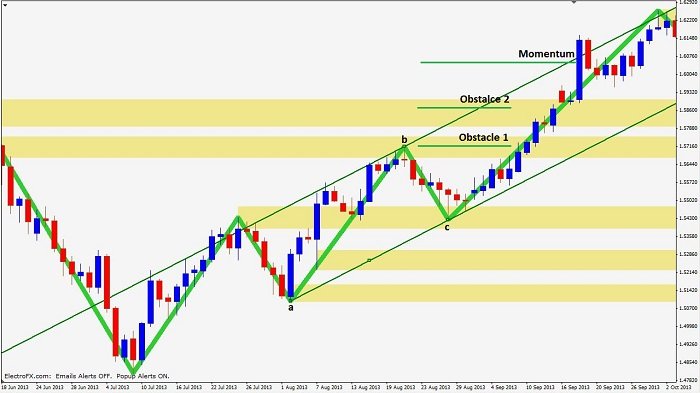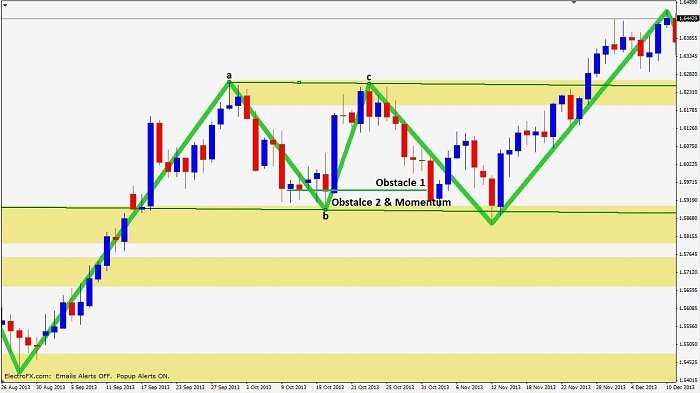
Predict the Future Based on the Past
You need a proper strategy for judging take profit and this piece of the puzzle basically means predicting the future. Fortunately the Forex market is a creature of habit and history tend to repeat itself. Furthermore, historical price movement allows you to assume the most probable future based on your trade being correct. This is all you can do as a trader, assume that you are correct and work with the most probable outcomes based on whatever proof you have at hand. In the previous lesson you were shown how to use a stop loss in case you are incorrect so the safety net is in place. Let’s now take a look at all of the different pieces of usable information that you will have access to before you enter any trade, and how you can use that information to your advantage.
Trend Continuation Buy Targets
Getting back to our first example we have the trend continuation trade. Whenever you enter a trade you will do so because you believe that you are correct, otherwise why would you be entering? So with that in mind there are two simple techniques that you can use to help judge where your trade will most probably reach. The first is as simple as using support & resistance and supply & demand areas which you can look at as obstacles. The second is to gauge the momentum behind your trade using the latest highs and lows that are being made.

When it comes to the horizontal obstacles in your trades path, the most conservative target is always going to be obstacle 1 and a slightly more ambitious target is obstacle 2. Taking the middle road and shooting bang smack in the middle of them both is also a very solid option. If you then apply momentum you can see make sure that all three of those options appear to be likely. If you target the edge of the predictive momentum you will be pushing the most ambitious and greedy target and it is not advised. It may have worked out in this particular trade but what you want is to be consistent rather than get the odd big win.
In order to help you understand how to plot momentum there is an a, b, and c marked on the above screenshot at the highs and lows that would be used. These are the latest pieces of information that you can use. Points a and b are permanent highs and lows that are indisputable at the time of your trade entry, point c is not yet a confirmed swing low at the time of your entry and it is your trade being correct that will make it one. Point c gets used because you are assuming that you are correct, remember? why else would you be entering the trade in the first place!
Double Top Sell Targets
Our next example is the double top which presents a slightly different scenario. Due to the nature of this pattern there is no real momentum and obstacle 2 is the momentum line itself. Obstacle 1 takes in to account all of those spikes on the candles that created the previous low (point b) and safely targets above them.

The conservative target here is obstacle 1 just as it was in the previous example, this whole concept is rinse and repeat so that part never changes. The more ambitious target is obstacle 2 which is also the momentum line and a safe play is right bang in the middle of it all. In the previous example you were following higher highs and higher lows so you could expect more of the same. In this example we have a double top to fight the uptrend so although you can expect a slightly lower low it is much safer to assume a slightly higher low.
Momentum was plotted the same as before, points a and b were permanent fixtures at the time of your trade but point c was not. At the time you would be taking this trade point c would be a prediction based on you being correct and that is why it is used.
3-Point Turn Buy Targets
Our last example is the 3-point turn which is also the break of the double top highs and back to following trend. A higher high can be expected and obstacle 2 in this trade is actually off of the screen. Obstacle 2 is exactly where the arrow indicates and if you want to take a look you will need to bring up a GBP/USD daily chart and look at 2011.08.23 to see it.

In this example you can see just how greedy and unsuccessful targeting the momentum line would have been. Try to only use the momentum line to gauge how probable obstacle 2 is vs obstacle 1, or vs the middle ground of the two. The momentum line was plotted the same way using permanent points a and b along with the assumed point c like before.
You Now Know Your Potential Reward Before Entering
You are now at a powerful position where you know how to intelligently choose your trades based on proof, and also how to judge your stop loss (risk) and your take profit (reward). In the next lesson we will look at just how important understanding risk vs reward will be for your trading career.
